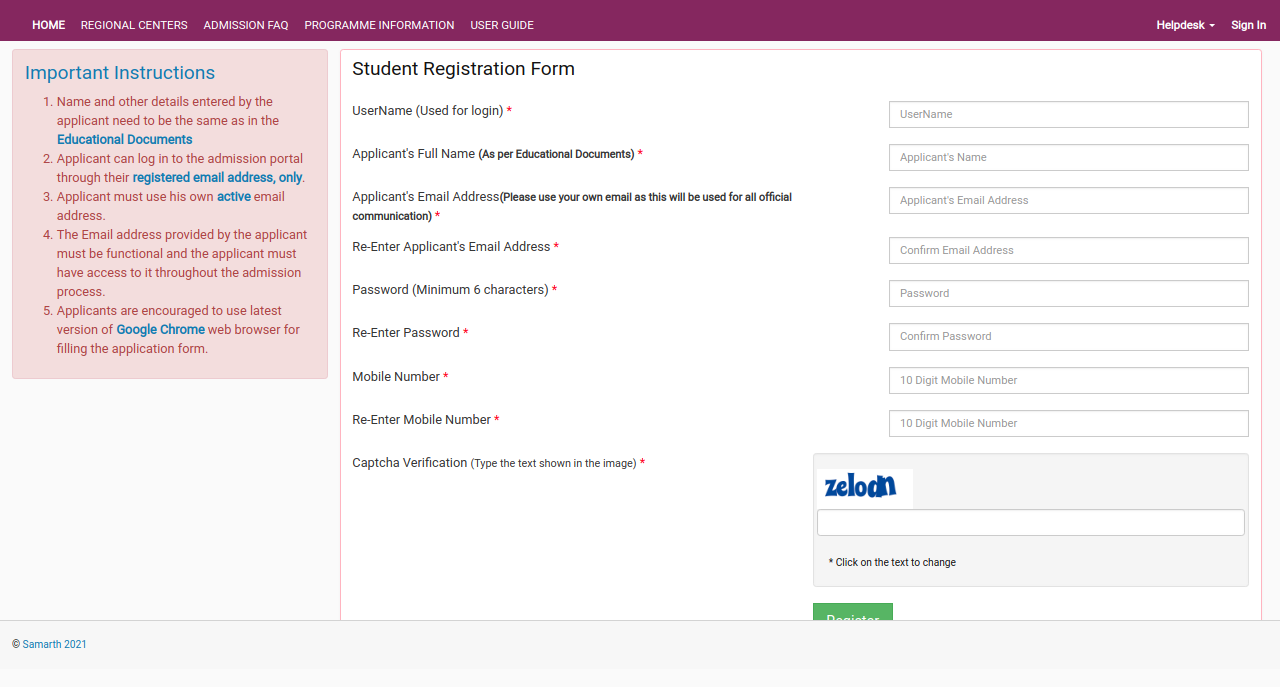UPES Integrated LLB Admissions 2026
Last Date to Apply: 25th Feb | Ranked #18 amongst Institutions in India by NIRF | Ranked #1 in India for Academic Reputation by QS Rankings | 16 LPA Highest CTC
Indira Gandhi National Open University (IGNOU) has opened the application form for various law programmes to be offered in the January 2025 admission cycle session in November 2024. Candidates can apply online till February 28, 2025. The application link for IGNOU law registration 2025 is given below. IGNOU law programmes 2025 include PG and advanced diploma, PG and advanced certificate courses and various other programmes. All these law programmes of IGNOU are offered in online, distance education mode. It should be noted that, IGNOU does not offer 3-year LLB, BA LLB, BBA LLB or LLM programmes because the apex legal education body, the Bar Council of India doesn’t recognise the law degree programmes completed in distance education mode.
Latest: IGNOU 2025 registration link
This Story also Contains

The law department of IGNOU is known as - School of Law, IGNOU. It was established in 2005 to impart legal education through the distance learning system. IGNOU offers Cyber Law, Criminal Justice, IPR, Para Legal, Consumer Law, Human Rights, Humanitarian Law and Human Trafficking and other programmes.
Indira Gandhi National Open University has released the IGNOU law application form for the January 2025 session in online mode in November 2024. Candidates have to simply register themselves for IGNOU law programmes by filling out the application form and submitting their application fee along with the course fee. The application process is explained below.
Last Date to Apply: 25th Feb | Ranked #18 amongst Institutions in India by NIRF | Ranked #1 in India for Academic Reputation by QS Rankings | 16 LPA Highest CTC
Admissions open for B.A.LL.B.(Hons.) & B.B.A.LL.B (Hons.) via NLAT @ NMIMS University
Visit the official admission portal of IGNOU.
Click on the link given for new registration.
Read the instructions and fill the registration form.

Select the law programme and mode of receiving study material.
Upload the relevant documents and submit the course fee using IGNOU’s payment gateway.
Take a printout of the filled-in application form for future reference.
Check IGNOU registration status once the status has been updated by the authorities.
Admissions open for B.A. LL.B. (Hons.), B.B.A. LL.B. (Hons.) and LL.B Program (3 Years) | School of Law, MRU ranked No. 1 in Law Schools of Excellence in India by GHRDC (2023)
North India's Largest Educational Group | NIRF Ranked 87 | NAAC A+ Grade | Highest Package 1.6 Cr
IGNOU offers a total of 11 programmes divided into the following programmes.
PG Diploma
PG Certificate
Diploma
Certificate
The details of IGNPU law programmes are given below.
Given below are the PG Diploma programmes.
Course duration - One year (maximum duration - three years)
Eligibility - The candidate should be a graduate in any discipline.
Course fee - Rs 10,200
Course duration - One year (Maximum duration - Three years)
Eligibility - Graduation in any discipline.
Course fee - Rs 10,800
The details of the PG certificate programmes offered by IGNOU are given below.
Course duration - Six months (maximum duration - two years)
Eligibility - The candidate should be a graduate in any discipline. Also, candidates who are 4th and 5th-year students of the Five-year integrated LL.B course and who have passed three years may also apply for PG Certificate in Cyber Law.
Course fees - Rs. 8.400
Course duration - 6 months (maximum duration - two years)
Course Fee: Rs. 9,600
Eligibility criteria
The candidates should have a degree in Science/Technology/Medicine.
Candidates appearing in the 4th or 5th year of the five-year integrated LL B Course who passed three years are also eligible to apply for a Post-Graduate Certificate in Patent Practice.
The diploma programme offered by IGNOU is given below.
Course duration - One year (maximum - 3 years).
Course fee - Rs. 8,400
Eligibility criteria
The candidate should have passed 10+2 or equivalent of IGNOU is Bachelor's Preparatory Programme.
Language - English and Hindi
SOL-IGNOU offers the following certificate programmes.
Certificate in Human Rights (CHR)
Certificate in Consumer Protection (CCP)
Certificate in International Humanitarian Law (CIHL )
Certificate in Anti Human Trafficking (CAHT )
Certificate in Co-operation, Co-operative Law (CCLBL )
Eligibility criteria
To apply for the IGNOU law certificate programmes mentioned above, the candidate should have passed 10+2 or its equivalent examination at a recognised board/institution, or Bachelor's Preparatory Programme (BPP) from IGNOU.
For IGNOU’s Certificate in Co-operation, Co-operative Law (CCLBL), the graduate freshers are eligible to apply.
Name of programme | Course duration | Fees |
|---|---|---|
Certificate in Human Rights (CHR) |
| Rs. 2,400 |
Certificate in Consumer Protection (CCP) | Rs. 1,800 | |
Certificate in International Humanitarian Law (CIHL ) | Rs. 2,700 | |
Certificate in Anti Human Trafficking (CAHT ) | Rs. 1,400 | |
Certificate in Co-operation, Co-operative Law (CCLBL ) | Rs. 8,400 |
IGNOU offers a doctoral degree in regular mode. The course details are given below.
The candidate should have a Master’s degree from a UGC-recognized university with at least 55% marks (50% for SC, ST, OBC (non-creamy layer) and differently able candidates.
GNOU conducts a national-level entrance test for admission to Qualifies in the entrance examination conducted by IGNOU at the National level for admission to Doctor of Philosophy in Law (PHDLE). The admission to PHDLE programme is conducted around the month of July, every year.
PhD in Law from IGNOU-School of Law - Duration and fee details
Name of programme | Minimum course duration | Maximum course duration | Course fee |
|---|---|---|---|
Doctor of Philosophy in Law (PHDLE) | Three years | Six years | Rs 16,800 |
Frequently Asked Questions (FAQs)
No, IGNOU doesn’t offer the LLB programme. Also, the Bar Council doesn’t recognise LLB done through distance mode.
No, IGNOU doesn’t offer LLM through distance education. It offers PG and diploma programmes in law.
The School of Law-IGNOU offers PG Diploma in Intellectual Property Rights and Criminal Justice.
The SOL-IGNOU offers PG Certificate in Cyber law and Patent Practice.
On Question asked by student community
You are eligible for the West Bengal primary teacher recruitment process because you passed TET in 2022 and completed D.EI.Ed in regular mode during 2019 to 2021. You also hold a graduation degree from IGNOU which is recognised by UGC and valid for teacher recruitment. The essential criteria include passing
Hello,
Congrats on completing both courses. Check the eligibility for that particular teacher requirements, if anything aligns with your degrees you can mention. This website provides you details about exam pattern, previous papers and many more related tou your education.
Hope it helps!
Hello aspirant,
Yes, IGNOUs PG Diploma in Geriatric Medicine is usually offered and continues to run as part of its medical and health sciences programmes. For the 2026 cycle , IGNOU generally opens admissions i jaunary and july sessions , and you can check official IGNOU prospectus or student portal
Hello
Yes, you can do an IGNOU B.Ed (distance mode) along with a regular M.Sc from another university at the same time.
UGC rules now allow students to pursue two degree courses simultaneously.
One course should preferably be in distance/ODL mode and the other in regular mode, which fits your
Having currently doing the PGDMCH from IGNOU, the eligibility for you to take the DNB PDCET after the completion of your ongoing diploma course to obtain a secondary degree might modify. You can check out the latest requirements and eligibility criteria for the DNB PDCET follow the given link
Among top 100 Universities Globally in the Times Higher Education (THE) Interdisciplinary Science Rankings 2026
Moot Court | Mock trials | Legal Aid Clinic
Among top 100 Universities Globally in the Times Higher Education (THE) Interdisciplinary Science Rankings 2026
NAAC A++ Accredited | Ranked #11 by NIRF
NAAC A+ Accredited | Among top 2% Universities Globally (QS World University Rankings 2026)
#14 in India by NIRF Ranking | NAAC A++ accredited | Approved by BCI | Scholarships Available